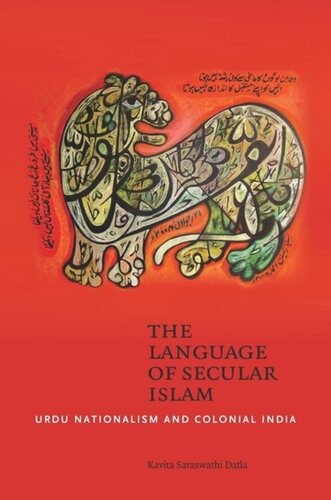

Most ebook files are in PDF format, so you can easily read them using various software such as Foxit Reader or directly on the Google Chrome browser.
Some ebook files are released by publishers in other formats such as .awz, .mobi, .epub, .fb2, etc. You may need to install specific software to read these formats on mobile/PC, such as Calibre.
Please read the tutorial at this link: https://ebookbell.com/faq
We offer FREE conversion to the popular formats you request; however, this may take some time. Therefore, right after payment, please email us, and we will try to provide the service as quickly as possible.
For some exceptional file formats or broken links (if any), please refrain from opening any disputes. Instead, email us first, and we will try to assist within a maximum of 6 hours.
EbookBell Team

4.8
54 reviewsDuring the turbulent period prior to colonial India’s partition and independence, Muslim intellectuals in Hyderabad sought to secularize and reformulate their linguistic, historical, religious, and literary traditions for the sake of a newly conceived national public. Responding to the model of secular education introduced to South Asia by the British, Indian academics launched a spirited debate about the reform of Islamic education, the importance of education in the spoken languages of the country, the shape of Urdu and its past, and the significance of the histories of Islam and India for their present.
The Language of Secular Islam pursues an alternative account of the political disagreements between Hindus and Muslims in South Asia, conflicts too often described as the product of primordial and unchanging attachments to religion. The author suggests that the political struggles of India in the 1930s, the very decade in which the demand for Pakistan began to be articulated, should not be understood as the product of an inadequate or incomplete secularism, but as the clashing of competing secular agendas. Her work explores negotiations over language, education, and religion at Osmania University, the first university in India to use a modern Indian language (Urdu) as its medium of instruction, and sheds light on questions of colonial displacement and national belonging.
Grounded in close attention to historical evidence, The Language of Secular Islam has broad ramifications for some of the most difficult issues currently debated in the humanities and social sciences: the significance and legacies of European colonialism, the inclusions and exclusions enacted by nationalist projects, the place of minorities in the forging of nationalism, and the relationship between religion and modern politics. It will be of interest to historians of colonial India, scholars of Islam, and anyone who follows the politics of Urdu.